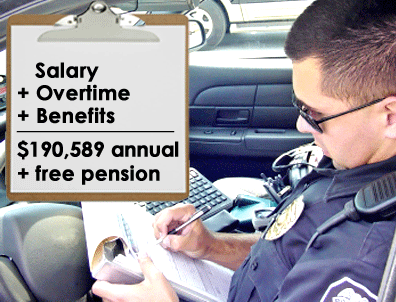
As Oakland struggles with a $31 million budget deficit, much of the focus has been on the generous salaries and benefits provided to the city’s police officers. The average annual cost of salary and benefits for one police officer is $190,589 compared to $177,888 for one firefighter, according to a letter written by Councilwoman Pat Kernighan. Starting police officers in Oakland earn about $70,000 a year, compared to those in New York City who make about $44,000 a year.
During good economic times, the Oakland Police Officers Association negotiated a contract in which police officers do not pay money into their pensions, unlike civilian employees and firefighters.
Under the current “3 percent at 50” pension formulas, a 30-year police veteran can retire with close to 90 percent of their last year’s salary. Paying the police pensions costs the city $8 million to $9 million a year, said City Councilwoman Jean Quan.
“That’s why we can’t balance the budget unless we cut the police somehow,” said Quan, a candidate for Oakland mayor in this November’s election.
Councilman Ignacio De La Fuente is in favor of police voluntarily contributing 9 percent of their salaries to their pensions.
“If sworn personnel do not contribute to their pensions,” he wrote in a recent letter, “we’ll be forced to cut officers.”
Of the city’s $400 million general fund, 75 percent is spent on police and fire service. The city is considering laying off 200 police officers to deal with the budget deficit. The decision needs to be made before the new fiscal year begins on July 1. The budget deficit means that even if all of the city’s libraries, senior centers and recreation centers were closed, it would still not close the budget deficit, according to a letter written by City Council President Jane Brunner.
“The city of Oakland is in crisis, and no one wants to cut police unless it’s absolutely necessary,” Brunner said in a recent interview. “And we’re looking at everything, and we may be in a situation where we do have to lay police off.”
Last year, the city negotiated a 10 percent reduction in total compensation for almost all employees. In the case of police, they gave back the raise they had previously negotiated, so their salaries stayed flat this year, according to Kernighan.
In the past 18 months, the city has laid off 150 employees and reduced the city’s workforce by 237 positions, which is less than three percent of the 5,574 total employees prior to the reduction.
In a recent letter Councilman De La Fuente wrote, “I have for months been urging the Oakland Police Officers Association (OPOA) to come to the negotiating table and agree to contribute to a portion of their pensions. Today their contribution is zero. A 9% contribution from police sworn personnel would save the City approximately $7.3 million per year. This figure is equivalent to the annual cost of 36 fully loaded (salary & benefits) police officers. Thus far the Oakland Police Officers Association (OPOA) has been unwilling to agree to this concession…”
The office of the police union (Oakland Police Officers Association) failed to return numerous calls from Visión Hispana requesting comment on the budget situation.
On June 24, the City Council voted to lay off 80 police officers, which will go into effect on July 12. The city may be forced to lay off an additional 122 officers in January if voters in November’s election don't approve a new tax or amend Measure Y, which is a parcel tax that raises $10 million for police and $10 million for violence-prevention programs as well as the fire department. Measure Y says that if the city falls below 739 police officers, the $10 million which funds 63 police officers cannot be collected.
Quan said the council is also considering an emergency measure to suspend the Measure Y baseline funding requirement, which would save at least 87 police officers, for now.
The council is also discussing the possibility of placing a parcel or utility tax on the fall ballot to raise revenue.
Councilman De La Fuente is against the ballot measures and has suggested selling the Henry J. Kaiser Convention Center as well as the city’s three golf courses, which would raise a total of $41 million.

